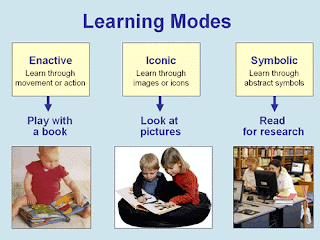Interactional Theories of Cognitive Development - Bruner & Vygotsky
Interactional Theories of Cognitive Development - Bruner & Vygotsky
Bruner studied the means by which human beings interact with
the environment cognitively. He states that the outcome of cognitive
development is thinking. Bruner agrees with Piaget regarding the
description of internal representation of experience. But Bruner emphasized
continuity, the importance of language and the importance of education in
cognitive development more than Piaget. According to Bruner, one's
intellectual ability evolves as a result of maturation, training and
experiences through a series of three sequential stages –the enactive ,iconic
and symbolic.
According to Bruner learning is an active process in which
learners construct new ideas or concepts based upon their current/past
knowledge. The learner selects and transforms information, constructs
hypotheses, and makes decisions, relying on a cognitive structure to do so.
Cognitive structure (i.e., schema, mental models) provides meaning and
organization to experiences and allows the individual to “go beyond the
information given”.
Implications
on the learning process
Bruner’s learning theory has direct implications on the
teaching practices. Here are some of these implications:
1.
Instruction must be appropriate to the level of the
learners.
2.
The teachers must revisit material to enhance
knowledge. Building on pre-taught ideas to grasp the full formal concept is of
paramount importance according to Bruner.
3.
Material must be presented in a sequence giving the
learners the opportunity to:
a. acquire and construct knowledge,
b. transform and transfer his learning.
a. acquire and construct knowledge,
b. transform and transfer his learning.
4.
Students should be involved in using their prior
experiences and structures to learn new knowledge.
5.
Help students to categorize new information in
order to able to see similarities and differences between items.
6.
Teachers should assist learners in building their
knowledge. This assistance should fade away as it becomes unnecessary.
7.
Teachers should provide feedback that is directed
towards intrinsic motivation. Grades and competition are not helpful in the
learning process. Bruner states that learners must “experience success and
failure not as reward and punishment, but as information” (Bruner 1961,
p. 26)
Socio-Cultural Theory - Lev Vygotsky
Vygotsky’s Socio-Cultural theory is one of the foundations
of constructivism.
The major theme of Vygotsky’s theoretical framework is that social interaction
plays a fundamental role in the development of cognition. In other words
social interaction is a major factor
that leads to Cognitive Development in children. A second aspect of Vygotsky’s
theory is The More Knowledgeable Other (MKO) The MKO refers to anyone who has a
better understanding or a higher ability level than the learner, with respect
to a particular task, process, or concept. The MKO is normally thought of as
being a teacher, coach, or older adult, but the MKO could also be peers, a
younger person, or even computers.
Another aspect is that the potential for cognitive development
depends upon the “zone of proximal development” (ZPD): a level of development
attained when children engage in social behavior. Full development of the ZPD
depends upon full social interaction. The range of skill that can be developed
with adult guidance or peer collaboration exceeds what can be attained alone.
Vygotsky
and Language
Vygotsky believed that language develops from social
interactions, for communication purposes. Vygotsky viewed language as man’s
greatest tool, a means for communicating with the outside world.
According to Vygotsky (1962) language plays two critical roles
in cognitive development:
1: It is the main means by which adults transmit information
to children.
2: Language itself becomes a very powerful tool of
intellectual adaptation.
Classroom Applications
A contemporary educational application of Vygotsky's
theories is "reciprocal teaching," used to improve students' ability
to learn from text. In this method, teachers and students collaborate in
learning and practicing four key skills: summarizing, questioning, clarifying,
and predicting. The teacher's role in the process is reduced over time.
Also, Vygotsky is relevant to instructional concepts such
as "scaffolding" and "apprenticeship," in which a teacher
or more advanced peer helps to structure or arrange a task so that a novice can
work on it successfully.
Vygotsky's theories also feed into the current interest in
collaborative learning, suggesting that group members should have different
levels of ability so more advanced peers can help less advanced members operate
within their ZPD.
Bruner
and Vygotsky
•
Both Bruner and Vygotsky emphasize a child's
environment, especially the social environment, more than Piaget did. Both agree
that adults should play an active role in assisting the child's learning.
•
Bruner, like Vygotsky, emphasized the social nature of
learning, citing that other people should help a child develop skills through
the process of scaffolding.





Comments
Post a Comment